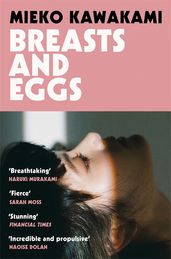Breasts and Eggs
Mieko Kawakami
Translated by Sam Bett & David Boyd
Synopsis
The bestselling novel about three women struggling to determine their own lives in contemporary Tokyo.
'Breathtaking' – Haruki Murakami author of Norwegian Wood
A New York Times 'Notable Book of the Year' and one of Elena Ferrante's 'Top 40 Books by Female Authors'. Shortlisted for the Warwick Prize for Women in Translation.
On a hot summer’s day in a poor suburb of Tokyo we meet three women: thirty-year-old Natsuko, her older sister Makiko, and Makiko’s teenage daughter Midoriko.
Makiko, an ageing hostess despairing the loss of her looks, has travelled to Tokyo in search of breast enhancement surgery. She's accompanied by her daughter, who has recently stopped speaking, finding herself unable to deal with her own changing body and her mother’s self-obsession. Her silence dominates Natsuko’s rundown apartment, providing a catalyst for each woman to grapple with their own anxieties and their relationships with one another.
Eight years later, we meet Natsuko again. She is now a writer and finds herself on a journey back to her native city, returning to memories of that summer and her family’s past as she faces her own uncertain future.
In Breasts and Eggs Mieko Kawakami paints a radical and intimate portrait of contemporary working class womanhood in Japan, recounting the heartbreaking journeys of three women in a society where the odds are stacked against them.
Translated from the Japanese by Sam Bett and David Boyd.
'Bold, modern and surprising' – An Yu, author of Braised Pork
'Incredible and propulsive' – Naoise Dolan, author of Exciting Times
Details
Reviews
I can never forget the sense of pure astonishment I felt when I first read Mieko Kawakami’s novella Breasts and Eggs . . . breathtaking . . . Mieko Kawakami is always ceaselessly growing and evolving
Incredible
Breasts and Eggs, which caused a small sensation upon its publication in the UK and US last year, was a fierce yet thoughtful tale of working-class womanhood
Bold, modern, and surprising







